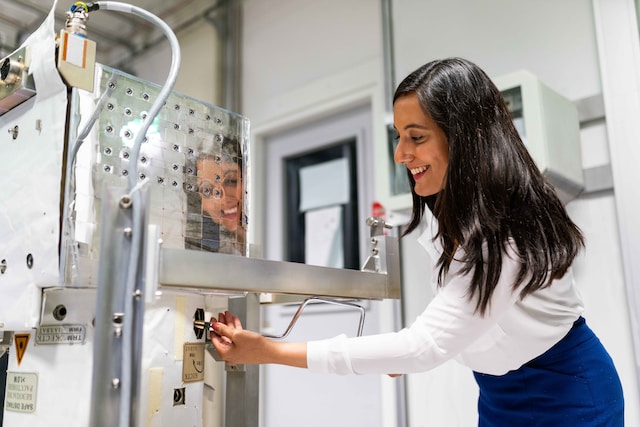As contemporary engineering trends lead to the rapid development of new technologies, there has been a commensurate development of new engineering jobs to serve and maintain those technologies.
This article will explore five of the most cutting-edge engineering jobs that are proving popular with candidates across the globe and ask:
- What steps can engineers take to prepare for a career in those fields
- What present-day problems are those fields concerned with solving
- What day-to-day work looks like for those specific engineering jobs
- What progression in those fields looks like
With candidates recognising engineering has the power to progress lives everywhere, one question jumps to the forefront: what are the top engineering jobs taking over in the present day, and are they future-proof?
1. Civil Engineering
Civil engineering is one of the oldest engineering disciplines, yet it continues to evolve as experts take steps to advance knowledge in its various supporting and sub-disciplines.
But what is civil engineering, specifically? In short, the profession deals with building and maintaining our towns and cities—from roads, bridges, railways and airports to developing sewage systems and constructing dams and coastal defenses.
Skills and responsibilities of a civil engineer
Civil engineers will need to develop their skills to address the problems of the present day, such as the decarbonisation of infrastructure and the creation of new road systems, which will make our towns and cities easier to navigate. The role and average day-to-day responsibilities of a civil engineer are varied but will often include the following:
- Consulting, designing and planning new infrastructure projects
- Preparing bids for tenders using research to make a strong case for an engineering project
- Analysing data using cutting-edge computer software and machine learning algorithms to recognise patterns and create projections of future trends
- Evaluating and refining projects to minimise environmental impact and disruption
- Developing sustainable systems for handling and recycling domestic and industrial waste, such as greywater processing plants
- Visits to ongoing project sites and refining of projects currently underway through the use of CAD software
- Meetings with local officials and community stakeholders
Alongside this, civil engineers will be expected to plan their tasks meticulously and have a clear picture of what is going on with all of the major projects they have underway.
Average civil engineering salaries
The average salary for a civil engineer hovers around £45,000, over 50% higher than the UK’s national average salary.
Civil engineers can anticipate around £30,000 per annum at the entry level, while seniority and extra responsibilities can see this figure rise to £80,000 or more. As such, civil engineers will be expected to focus on building their skills and education to progress up the pay scale in their careers.
How to become a civil engineer
So, what can candidates do to prepare for the civil engineering jobs of the present day and to build their careers for future developments in the field?
- First and foremost would be to complete initial training in civil engineering by taking a degree in a relevant engineering subject
- However, it is possible to transition from other engineering sectors. Postgraduate courses allow engineers to specialise in specific sectors following their undergraduate degrees
- These degrees will often satisfy the requirements to become an Incorporated Engineer (IEng) and allow candidates to become Chartered Engineers (CEng)
Candidates will typically move into traineeships, graduate schemes, or entry-level civil engineering roles as a first step after completing their education.
Civil engineering career prospects
Seniority and progression open up as professional qualifications are gained through the mentorship and training offered by employers.
Civil engineers are highly employable across the globe, and consulting firms also offer experienced professionals an opportunity to work within a foreign country and deliver on that nation’s infrastructure projects while still having a connection to their home nation. Civil engineering offers a wealth of opportunities for those looking to explore a career that could take them all over the world.
Always giving something back to their communities and working hard to enhance lives, it’s no surprise that senior civil engineers are found working in international development and disaster relief. At this stage, senior civil engineers can advise on earthquake engineering or on building resiliency into local infrastructure following a natural disaster.
2. Aerospace Engineering
To answer the question “what is aerospace engineering?” we must understand aerospace engineers deal with avionics systems that power flight and enable pilots to avoid thunderstorms and terrain. In short, aerospace engineering is a discipline concerned with aircraft design, manufacturing, and ongoing maintenance.
Skills and responsibilities of an aerospace engineer
An aerospace engineer's day-to-day role and responsibilities will differ depending on their specialisations. For example, an engineer working for a defence contractor may focus their day on working on a targeting system for a fighter aircraft. In contrast, an engineer in commercial aviation will likely focus on reducing inefficiencies in aircraft design or increasing profitability by lowering the airframe's weight.
Like many of the careers in this article, aerospace engineers will not often see two similar days, but most of their tasks will involve their skills in:
- Working with mathematical and computer analysis software to develop and modify designs for different engineering requirements
- Combing through data from inspections and reports to ensure aircraft meet environmental and quality requirements
- Approaching their work methodically
- Problem-solving approaches to repair work, even when under pressure and tight deadlines
- Knowledge of the commercial aspects of the aviation industry
Typically, aerospace engineers at all levels will spend their days focusing on tackling present-day problems in aircraft design and development, with tasks including:
- Developing compact and functionally efficient avionics systems and engines
- Conducting flight testing to measure take-off distances, stall speeds, climb rates and ease of navigation
- Inspecting aircraft and carrying out repairs
- Communicating with and managing the expectations of clients and suppliers
- Meeting increasingly complex customer demands in the commercial and military aviation sectors
- Decarbonising aircraft propulsion through new engine designs and researching sustainable jet fuels
- Using computational design and data analysis to enable cost and time savings across the life cycle of an aerospace engineering project
Despite the industry's challenges, the future of aerospace engineering is bright. With innovative and transformative approaches to these challenges, the demand for air transport can continue to be met whilst lowering the environmental impact of the manufacturing and propulsion of aircraft.
Average aerospace engineering salaries
The average base salary of an aerospace engineer is around £38,000, with experience and additional qualifications seeing this figure rise to around £70,000, in line with other engineering disciplines.
Moving into the defence sector is also lucrative, with salaries reaching £93,000 at executive levels.
How to become an aerospace engineer
Preparing for a career in aerospace engineering typically involves an undergraduate or postgraduate degree from a university in a related field, such as:
- Electrical engineering
- Mechanical engineering
- Robotics
- Mathematics
- Physics
Most universities offer master’s courses accredited by the Royal Aeronautical Society (RAeS) and the Institute of Mechanical Engineers (IMechE). In addition, some are now offering undergraduate degrees specifically focused on aerospace engineering.
Work experience is often necessary for an entry-level appointment with an aerospace engineering firm. Degree-granting institutions will often offer placement years for their engineering students as they recognise the importance of these on-the-job training opportunities.
Aerospace engineering career prospects
Many large aerospace engineering firms will offer their employees continuous professional development to retain and up-skill their talent. These schemes involve placements with their overseas partners, allowing engineers working in the field to have the ability to travel the world and experience several working environments.
Keeping up to date with critical developments in the field will open up opportunities for aerospace engineers to enter roles with more senior responsibilities.
With seniority, employees will often specialise in a specific sub-discipline, such as aerodynamics, fuel efficiency, or the investigation of air accidents. There are opportunities to discover in several sub-sectors—from commercial aviation to military and space.
3. Biomedical Engineering
Biomedical engineering utilises the understanding of the human body developed in physiology and life sciences jobs alongside contemporary technology trends to create medical devices and diagnostic equipment that assists people in living longer, healthier lives.
Biomedical engineers develop medical imaging technologies and surgical equipment. They are also involved in cutting-edge developments in therapeutic medical devices, such as artificial body part replacements.
Skills and responsibilities of a biomedical engineer
Often at the forefront of developments in science and technology, biomedical engineers are uniquely poised to address the issues in medical care.
Given they’re working in a fast-paced environment where organisational change and project development are subject to rapid shifts, all days will be different for the average biomedical engineer. Despite this, their work will often involve responsibilities such as:
- Working closely with physiologists, GPs and other medical professionals—as well as with patients and carers
- Collaborate with colleagues in manufacturing, quality control and marketing to understand the legislation surrounding the advertising of medical devices
- Testing and maintaining equipment, and training medical staff to use their new devices
- Working with diagnostic and clinical data to understand bioelectric and physiological processes
- Conducting in-depth research in the life sciences, robotics, kinetics and mechanical engineering to guide project work
- Using CAD software, artificial intelligence and machine learning algorithms to design and test new products, materials and medical devices
Biomedical engineers will be skilled in understanding how engineering and medicine can integrate to enhance lives and possess the capacity for creativity since addressing the most complex issues within medical care will require out-of-the-box thinking.
In addition, communicating with internal and external project stakeholders, solving problems and developing a commercial awareness of how medical devices are marketed would also help a biomedical engineer to work effectively.
Average biomedical engineering salaries
Jobs within the public sector offer a biomedical engineering role on average £25,000 at the entry-level, whilst seniority will see this grow to around £40,000.
In the private sector, biomedical engineers often earn the same average wage at lower levels of the organisation. Still, seniority can see this figure increase over the highest pay grade offered by public sector organisations, topping out at around £61,000.
How to become a biomedical engineer
Candidates looking to enter the biomedical engineering career path would undertake one of the biomedical engineering degrees offered by universities—awarding BEng or MEng qualifications.
With experience comes progression, and senior biomedical engineers will sometimes find themselves leading and mentoring teams of entry-level staff and monitoring project schedules and budgetary constraints.
Biomedical engineering career prospects
Senior biomedical engineers will specialise in a subfield, from developing therapeutic devices to rehabilitation engineering.
Working with a public sector organisation such as the NHS, a biomedical engineer’s career progression and training will be guided through the Scientist Training Programme (STP), culminating in a master’s degree in clinical engineering. Those interested in the long-term career prospects offered to biomedical engineers can explore our sector specialisms page.
Working within the private sector will see engineers needing to earn CEng status with an engineering organisation, like the Institute of Physics and Engineering in Medicine (IPEM) or IMechE. Networking is a vital skill for biomedical engineers seeking seniority or leadership roles to develop, and these industry bodies will run conferences and courses to encourage this amongst their members.
4. Alternative Energy Engineering
Alternative energy engineers work in various fields, from renewables such as wind, hydrological or solar power to research into the development of fusion technologies through an institution such as the UK Atomic Energy Authority’s Culham Centre for Fusion Energy (CCFE).
Skills and responsibilities of an alternative energy engineer
An alternative energy engineer will need to take a multi-disciplinary approach to their field, exhibiting an interest in the broader fields of engineering, technology, and environmental science.
The average day in alternative or renewable energy careers differs significantly between the sub-disciplines of the field, and even in the same role, all days can present different tasks.
From alternative energy engineering to battery storage jobs, however, some aspects will correlate:
- A fundamental focus on ensuring equipment continues to run without fault
- Monitoring issues, tracking equipment and providing its repair
- All roles within the field will require some project management experience
- Data analysis and reporting of project efficiencies and refinements required in processes
- The use of CAD software to design new energy-efficient systems, generators and storage solutions
Professionals entering the alternative and renewable energy field will assist in solving the problems that will enable renewables to assist in the fight against climate change and environmental degradation, including:
- Improving design, manufacturing and installation processes for renewable energy sources
- Reducing the costs incurred through these aspects of renewable energy, engineers can help to increase their adoption
- Developing new battery and energy storage technologies
- Solving energy grid instability as we transition to renewables, preventing blackouts and accommodating growing energy requirements
- Shaping the future of local and national government policies and legislation through innovative work in research and development
Aside from the technical aspects of their skill set, such as mathematics and physics knowledge, they will need to develop a commercial understanding of the energy market to assess their projects and communicate effectively with internal and external stakeholders.
Average alternative energy engineering salaries
At the entry level, renewables and alternative energy engineers can expect to earn around £29,000, while seniority and additional responsibilities see this yearly salary grow to £70,000 at the executive level.
How to become an alternative energy engineer
Pursuing a career in alternative energy engineering or renewable energy would usually require candidates to possess at least an undergraduate degree in an engineering or scientific field, often with a specialisation at the master's level.
Some of the degree courses that could lead to a career in alternative energy engineering are:
- Physics
- Mathematics
- Electrical engineering
- Mechanical engineering
- Environmental and Earth sciences
- Petroleum and energy engineering
Like the other fields in this list, achieving IEng or CEng status is incredibly useful for candidates looking to enter the area, as these qualifications are internationally recognised and can offer candidates an opportunity to specialise at the postgraduate level.
Alternative energy engineering career prospects
Engineers working within the alternative energy or renewables field will be expected to engage in continuous professional development, conferences, and workshops to keep up to date with the latest discoveries.
Seniority and leadership responsibilities will become available to alternative energy engineers with experience and professional accreditation.
At this level, engineers will be expected to specialise in research and development, whilst executives within the field are increasingly entering consultancy roles so they can demand higher salaries and choose the initiatives on which they work. For those looking to learn more about advanced roles in renewable energy, they can explore our sector page to discover career prospects.
5. Robotics Engineering
From manufacturing to automation engineering jobs, robotics engineering is already revolutionising how we produce goods, deliver services, and analyse vast quantities of data.
Bridging the gap between engineering and computer science, robotics engineering jobs have a bright future ahead. With the widespread adoption of artificial intelligence and machine learning technologies, employees in all fields can autonomously complete burdensome and repetitive tasks.
Skills and responsibilities of a robotics engineer
As robotic devices become increasingly complex and intelligent, robotics engineers must enhance their skills to remain relevant. Aside from skills in technology, mathematics and computer science, they will also need expertise in the following:
- Visual design and information architecture
- Good verbal communication skills
- Technical skills in repairing and maintaining the robotic devices they build
- The ability to develop new software solutions and leverage artificial intelligence to solve the complex problems which they will encounter in their work
- An understanding of cognition, psychology and information processing if they are to integrate artificial intelligence or machine learning into their robotic constructions
As with the other careers in this list, a robotics engineering job will bring several tasks, and no two days will be the same for engineers working in the field:
- Technicians and mid-level engineers will often install, calibrate and maintain robots, whether in a factory or elsewhere
- They will also analyse and debug the programming and parameters their robots are powered by
- Senior engineers will often supervise technologists and mentor junior engineers and technicians' teams, ensuring their continuous professional development
- Senior engineers will often supervise technologists and mentor junior engineers and technicians' teams, ensuring their continuous professional development
Average robotics engineering salaries
Regarding pay, a robotics engineer's salary often edges toward £70,000 at the executive level, depending on the candidate’s location, responsibilities and organisation.
The average salary candidates will encounter at the entry-level will be around £30,000, whilst five to seven years of experience will rise to around £55,000.
How to become a robotics engineer
Entry-level technician roles exist for those asking how to become a robotics engineer. However, the most common route for entry is either an undergraduate or postgraduate degree in engineering. Candidates with experience in computer science, mathematics, physics, or another engineering sector can specialise in robotics at the master's level.
Progression will often involve experience and further study, with advanced roles such as lead engineer offering responsibility for designing and managing robotics projects and seniority allowing for specialisation in an area of robotics such as autonomous vehicle design and human-robot interaction. Robotics is an exciting and cutting-edge area, and those looking to learn more can explore our advanced engineering sector page.
Robotics engineering career prospects
Progression in robotics is similar to the other specialisms in this article, with accreditation with an institutional body, work experience and additional qualifications allowing candidates to find work with companies in foreign countries more easily or to secure high-paying executive or leadership roles.
Robotics engineers are in a good position as the digital revolution proceeds apace, with senior engineers having the ability to specialise in emerging technologies such as artificial intelligence, autonomous vehicles or surgical devices.
We’re an expert engineering recruitment agency
At Amoria Bond, our award-winning team focuses on progressing lives everywhere, every day. If you’re interested in learning more about our work as an expert engineering recruitment agency, see our Advanced Engineering specialisms page or contact one of our consultants.






